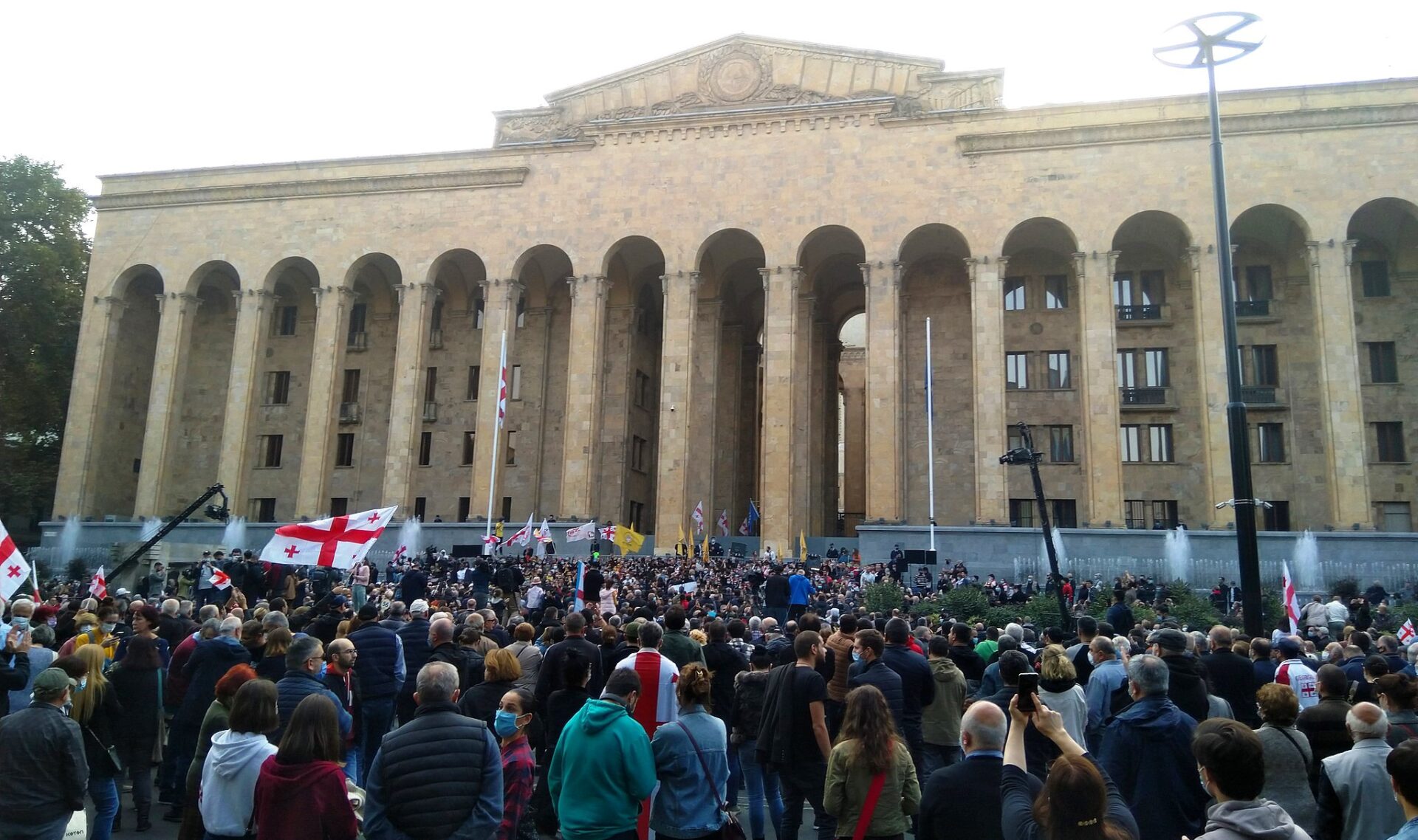(PONARS Eurasia Commentary) Mikheil Saakashvili, the former president of Georgia and de facto leader of the opposition United National Movement (UNM), is not a saint. But after seven weeks on hunger strike, protesting what he considered his illegal detention, he was almost a martyr. He has since given up his hunger strike, as have ten other MPs in his party. Saakashvili finally appeared in the Tbilisi City Court on November 29, following the Georgian government’s agreement to transfer the former president to a military hospital in Gori where he could get proper care. In court, Saakashvili was accused of exceeding his presidential powers on November 7, 2007, when he ordered the violent dispersal of a public demonstration. In a long and egotistical address to the court, Saakashvili described himself as the creator of modern Georgia, and accused the government of bringing the country to the level of Venezuela. Saakashvili’s speech drove his critics into a frenzy. Irakli Kobakhidze, chair of Georgian Dream, the party currently in power, accused Saakashvili and the UNM of “torture, inhuman treatment, rape, [and] racketeering.”
Heroes, villains, martyrs, victims—this is the stuff of Georgian politics today. It is a reflection of Georgian “crypto-politics,” or the hollowing out of parties, disconnected from the lives and needs of their citizens. Georgia is a drama of misrule, a festival of self-absorbed politicians who, if it wasn’t for the seriousness of the matter, would be better suited in the cast of the commedia dell’arte.
Polarization
Steven Levitsky and Danial Ziblatt tell us in their book, How Democracies Die, that historically, “extreme polarization” can “kill democracies.” Georgia is not Belarus, and the current prime minister, Irakli Gharibashvili, is no Aleksandr Lukashenko. But Georgia’s political elites, riding high on the rhetoric of division and fear, are putting the country’s democratic gains at risk. Since independence in 1991, the political middle in Georgia has been marginal. The hope for a prosperous middle class that could transform political militants into moderates turned out to be a western illusion. We should not be surprised, given the vast economic inequalities that continue to shelter Georgia’s rich from the large underclass of unemployed and underemployed. Extreme inequalities of wealth have stymied economic mobility and the expansion of Georgia’s embryonic middle class. The official unemployment rate is 22 percent, though, in reality, it is at least double this.
There were glimmers of a functional democratic coalition in the first years of the Georgian Dream government after its parliamentary victory in 2012. But when then-President Saakashvili and Bidzina Ivanishvili, the billionaire leader of the victorious Georgian Dream coalition, reluctantly shook hands at the Presidential Palace to mark the transfer of power from one party to the other, it only concealed a sentiment of revenge which drives Georgia’s two main political parties. The exercise of democracy in Georgia—whether in the parliamentary chamber, during elections, or at public demonstrations—only deepens the chasm between the two. Georgia is in a state of cold civil war. Unforgiving rhetoric between the two sides has made peacemaking and compromise practically impossible. Georgian Dream representatives are holed up in the ministries, while the UNM mobilizes its supporters onto the streets, ready to “take back power.” Normal democratic politics, or the promotion of social and economic policies designed to improve the lives of Georgia’s citizens, has been disabled. Instead, we have spectacle – hunger strikes, riot police, and the language of payback and retribution. The stakes have become too high for a retreat. Georgian Dream, like its predecessors—including Saakashvili’s UNM when it was in power—seeks a political monopoly. Sharing power, even at the municipal level, would be an acknowledgment of defeat, and the loss of power in elections would likely lead to prison. For the UNM, militant opposition has become a source of identity – without it, the UNM will lose its meaning. But this political drama seriously endangers Georgian democracy, and with it, the crucial support of the EU and the United States.
Georgian voters are far more politically mature than their leaders. Polls have consistently demonstrated that the people’s priorities are focused on employment, the cost of living, poverty, healthcare (including COVID19), pensions, and schools. They are united around a pro-western foreign policy. But when it comes to the parties which represent them, a February 2021 poll conducted by the International Republican Institute showed that 62 percent of Georgians had an unfavorable view of their activity. The majority of Georgians do not identify with any party. A 2020 study by the Caucasus Resource Research Centers (CRRC) revealed that in July 2019, only 19 percent of poll respondents identified with Georgian Dream, and 9 percent with UNM. The data also showed few differences between supporters of the main two parties on social values and policy. The CRRC report concluded that there were few “statistically significant, let alone substantively large, differences in policy preferences or values between the major parties.” The problem, rather, lies with Georgia’s politicians. They forsake the social and economic concerns that unite Georgians for emotional and personal battles, characterized by unforgiving rhetoric and displays of self-sacrifice and potential martyrdom. Their theatrical performance, amplified by Georgia’s partisan media, undermines the broad political consensus necessary for a stable democracy.
Democratic Instability
Despite the noise generated by Georgia’s political leaders, the country’s citizens are disengaged. This is damaging and leaves the political stage to party elites which have shown little interest in solving the economic and social problems faced by their constituents. This is in part due to the popular tradition in Georgia of politicians as patrons who use personal networks rather than institutions and parties to secure their goals. But it is also a structural problem: election systems have failed to tie parties to their constituents. The decision to switch to a fully proportional electoral system (PR) in 2024 may benefit small parties, but it will not enhance accountability and will not stabilize inter-party relations. Political philosopher Karl Popper remarked that under PR, you can no longer choose a person who you trust to represent you. You can only choose a party, “and the people who may represent the party are chosen only by the party.” This is why Georgia’s political elites can behave as they do. They are untethered and unconstrained by their voters. The social and economic priorities that Georgian voters share, along with their concern for real outcomes, are precisely the ingredients Georgia needs to overcome parliamentary crypto-politics.
Georgian democracy cannot do without political parties, but as the last three decades have revealed, parties are insufficient instruments for citizen engagement. Georgia’s minority of professional politicians has shown a lack of personal responsibility for their actions and an inability to tackle the massive problems faced by the country. Proportional representation will not solve the problem, nor will Georgia’s political parties. Rather the country needs a network of citizen-based institutions, public bodies with the power to participate in government policy and to focus attention on the social and economic problems that undermine Georgia’s democracy. Citizen Assemblies and Councils and other deliberative bodies will not replace parties, and they are not suitable for all aspects of government. But they should be institutionalized and given decision-making powers in selected policy areas. This will enhance the power of citizens, improve trust in governance, and pressure Georgia’s leading politicians to pay attention to the country’s real needs. Such bodies have worked in Australia, Belgium, and Canada, and they can work in Georgia too.
Stephen F. Jones is Professor at Mount Holyoke College and incoming Director of the Program on Georgian Studies at Harvard University’s Davis Center for Russian and Eurasian Studies. Disclosure: although fully independent, the Program receives funding from the Georgian government.











